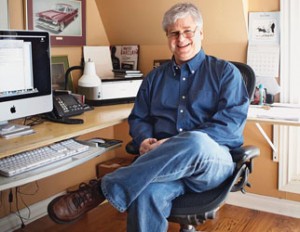Living on the edge
Writer Linwood Barclay on how leaving his salaried job at age 53 was like jumping into a pool of freezing water.
Advertisement
Writer Linwood Barclay on how leaving his salaried job at age 53 was like jumping into a pool of freezing water.

I am a weenie.
I am not what you’d call a risk taker. Okay, a handful of times, maybe. I’ve been known to overstay my time at a parking meter. I’ve figured what the hell, I’m going to have bacon and eggs at dinner, even though it’s really a breakfast meal. I have removed “Do Not Remove” tags from mattresses.
I’ve lived on the edge.
But generally, when it comes to matters involving career and finance, I tend not to take chances. I treasure security, and I like sleeping at night. Between the ages of 22 and 53, I held salaried jobs. I made a set amount every week as a journalist at three different papers over the years, 26 of them at the Toronto Star. Reporters, editors and columnists are not typically on commission. I didn’t depend on bonuses. If the Star sold an unusually high number of copies on a day when my column was in the paper, I did not get a few extra bucks based on royalties.
And that was just fine with me. I had a steady job, a consistent salary, and best of all, a dental plan. I can not stress enough the sense of well-being that comes from a dental plan. When you’re in the chair and the dentist says, and I am just slightly paraphrasing here, “I’m going to have to build a bridge across your periodontal bicuspid molarity and put up a plaque,” that can be a major financial concern if you don’t have a dental plan. (By the way, every time I go they give me a container of floss. I have, like, 20 of those things now.)
There were plenty of other benefits, too. A drug plan, sick days, you name it. Once a year, the publisher would come out to your house and clean your eaves.
So quitting a salaried job, at the age of 53, quite a few years before the standard retirement age, well, that took some thinking. Like jumping into a pool of freezing water. You spend a lot of time with your toes curled over the edge.
In 2003, in addition to cranking out more than 120 columns a year, I started writing books. My first novel, Bad Move, came out in 2004. My publishers liked that one enough, so they asked for another. And another. When you’re writing crime fiction, the expectation is that you’ll deliver a manuscript every year. But if you added up all the advances for my first four books, they didn’t even come to a year’s salary at the paper.
It was pretty clear I was not about to quit my day job to write books. Not unless I wanted to put my family and myself on a very restrictive diet.
But a book a year, and all those columns, was draining. I used Star vacation time to finish books. I was going to the same creative well for everything. But I did not want to give up the novels. All I’d ever wanted, since I was in my teens, was to write crime fiction. (Ross Macdonald, author of the Lew Archer mysteries, was my Gretzky.)
Then, in 2006, something happened. I knocked off a book called No Time for Goodbye.
Publishers all over the world bought rights to it. It came out first in Germany in 2007 and sold nearly half a million copies. In England, it was selected by a TV show’s book club, and sold more than 600,000 copies, finishing out 2008 as the single bestselling novel of the year in the U.K. It got optioned for film. I was contracted to do more books for increasingly substantial sums.
The first thing we went out and bought (I am not making this up) was a high-end Miele vacuum cleaner. (I use it to clean the mid-life-crisis-mobile I have since purchased.)
Even though my future as an author was secure, I agonized over quitting the day job. My wife and I took long walks while I weighed the pros and cons of devoting myself exclusively to books. A lot of this had to do with the fact that I loved writing the column. You wrote whatever the hell you wanted, and they put in the paper. (Honestly, sometimes, you had to wonder what they were thinking.)
And, even more than the dental plan, it was safe. A weekly paycheque. No surprises. You hung in until retirement, you took your pension, and Bob’s your uncle.
It was sweet. But being able to write a book a year, and nothing else, was even sweeter.
My wife did some health plan shopping, and found we could get our own dental plan. After that, it was a no-brainer.
I’m still pretty much a weenie (not a great image for a guy who writes thrillers), but not to the point that I’d pass up a chance to do what I’d always wanted. And now, I am going to have bacon and eggs for dinner. So there.
Linwood Barclay was the Toronto Star’s humour columnist until 2008, when he left to become a full-time novelist. His most recent book is Never Look Away.
Share this article Share on Facebook Share on Twitter Share on Linkedin Share on Reddit Share on Email